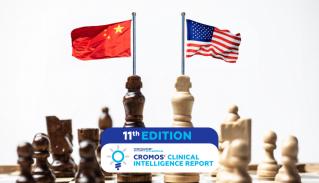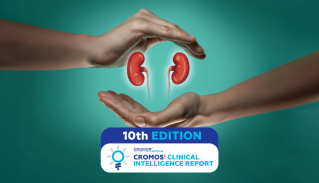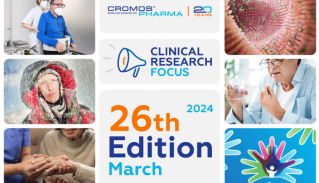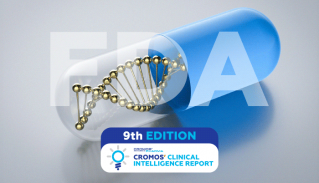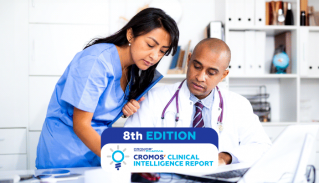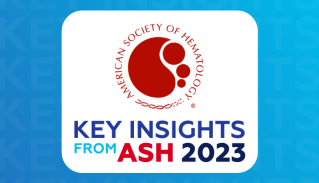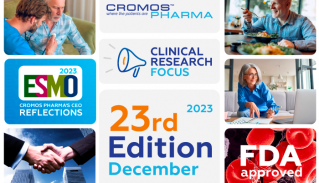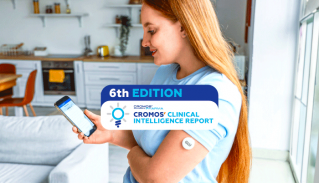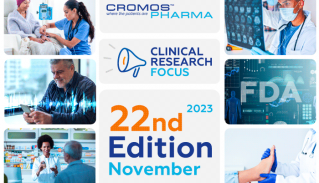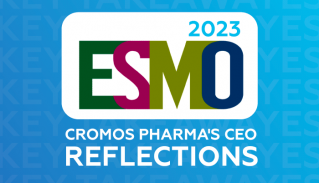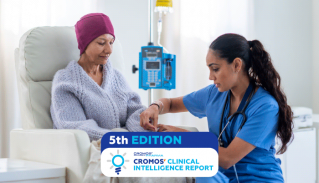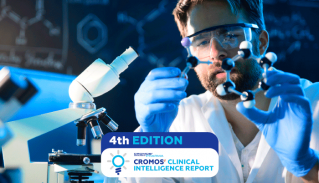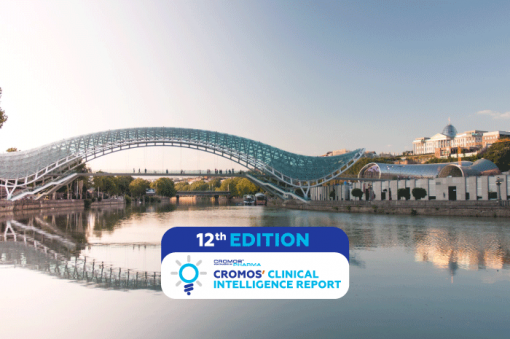
Сlinical Trials in Georgia 2024
Georgia, a country nestled between Eastern Europe and Western Asia, has emerged as a promising destination for clinical trials. With its strategic location and favorable regulatory environment, Georgia has become increasingly attractive to international sponsors seeking to conduct innovative research projects.
Since 2013, Cromos Pharma has been at the forefront of managing clinical research in Georgia, establishing a strong presence in Tbilisi, and overseeing a multitude of successful regional and global studies across various therapeutic areas. The country’s burgeoning clinical research landscape has experienced exponential growth, offering ample opportunities for novel studies and rescue clinical trials.
One of the key advantages of conducting clinical trials in Georgia is its efficient regulatory approval process. Sponsors benefit from a streamlined pathway to regulatory clearance, allowing for expedited study initiation and execution. Additionally, Georgia boasts significant untapped patient populations across diverse therapeutic areas, providing researchers with access to a wide range of participants for their studies. Moreover, the country is home to skilled medical personnel who are well-equipped to support clinical research initiatives. Combined with a conducive economic environment for business, Georgia offers a compelling proposition for sponsors looking to advance their research objectives.
Country Overview
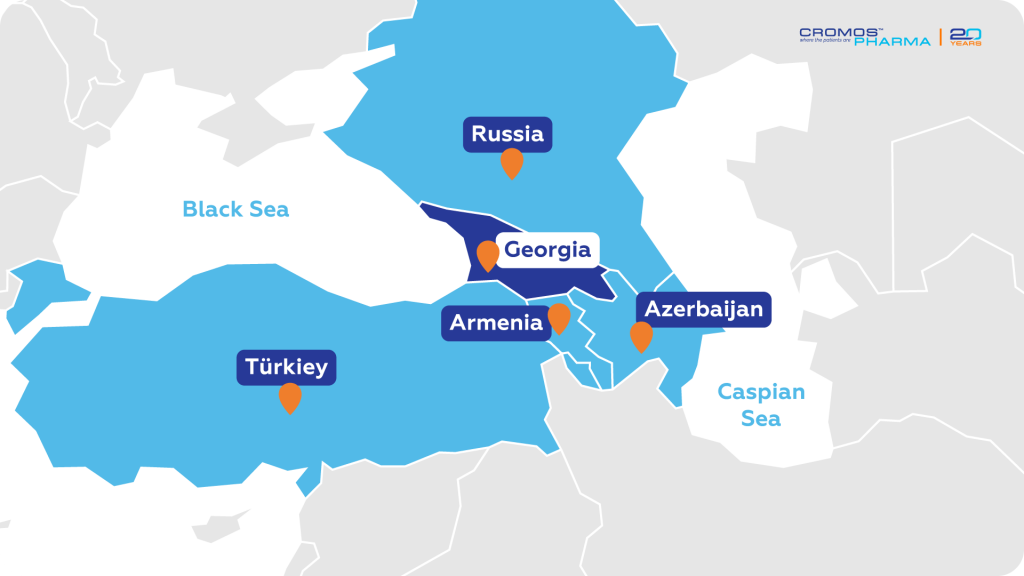
Georgia, officially known as the Republic of Georgia, is located at the crossroads of Eastern Europe and Western Asia. Situated between the Black Sea to the west and the Caspian Sea to the east, Georgia shares borders with Russia to the north, Azerbaijan to the southeast, Armenia to the south, and Turkey to the southwest. Its strategic position allows for significant cultural, economic, and geopolitical interactions with neighboring countries.
According to the most recent United Nations World Statistics Pocketbook, its land area covers more than 69,000 square kilometers. Georgia offers a diverse landscape ranging from coastal plains along the Black Sea to high mountain ranges in the north. The country’s geographical diversity contributes to its rich biodiversity and varied climate, making it an ideal setting for a wide range of clinical research studies.
Demographics
The World Bank data from 2022 indicates that there are more than 3.7 million people and the country’s estimated GDP is $19.8 billion.
Moreover, Georgia’s research culture is on the rise, as reflected in its Global Innovation Index ranking, where it holds a prominent position in the region. As of 2023, Georgia ranks among the top countries, showcasing its growing capability to conduct innovative research across various fields, including medical research.
Socioeconomics
The capital of Georgia is Tbilisi, which is also the largest and most densely populated city in the country. The urban centers serve as focal points for potential clinical trial participants due to their significant population concentrations and advanced medical infrastructure.
Georgia’s key trade partner is the European Union (EU), with whom it conducts trade under various agreements. Georgia enjoys a robust trade relationship with the EU, marked by the Deep and Comprehensive Free Trade Area (DCFTA) agreement.
According to World Statistics Pocketbook, Georgia’s other significant trade partners include countries such as Türkiye, China, and Azerbaijan. Positioned at the crossroads of Europe and Asia, Georgia serves as a key transit hub for international trade, enhancing its significance in global trade networks.
Maintaining diplomatic relations with neighboring countries enhances Georgia’s access to vital resources crucial for supporting the clinical research sector and fostering economic growth.
At a Glance: Georgia’s Health and Pharmaceutical Industry
- As of the year 2021, the life expectancy at birth is 72 years. The share of people older than 69 is 6.1%.
- Data from UNICEF (2021) indicate that the infant mortality rate is 9.5 deaths per 1000 live births.
- The pharmaceutical market in Georgia is projected to reach $127.70 million by 2024, with a focus on oncology drugs. The market is driven by increasing demand fueled by rising health awareness. Supported by macroeconomic factors like economic growth and healthcare expenditure, the market shows promising potential for further expansion and development.
Status of the Healthcare Sector in Georgia
The healthcare sector in Georgia has demonstrated significant growth and development over the past decade. From 2013 to 2022, the sector’s output exhibited a consistent upward trajectory, reaching $888.9 million in 2022, marking a substantial increase of 2.6 times compared to 2013. This growth reflects a Compound Annual Growth Rate (CAGR) of 10%, showcasing the sector’s resilience and potential for expansion.
Georgia’s healthcare landscape is characterized by a diverse array of participants, contributing to high levels of competition within the sector. Financially, the healthcare industry has performed positively, with total revenue escalating from $444.4 million in 2018 to $666.7 million in 2021. Despite the challenges posed by the COVID-19 pandemic, which impacted clinic revenues and expenses in 2020, subsequent years saw significant recovery, with the EBITDA margin increasing to 25% in 2021. Moreover, with the expansion of the state’s universal healthcare program and targeted initiatives such as organ transplantation, the healthcare sector in Georgia is poised for further growth and development.
Reasons to Conduct Clinical Trials in Georgia
Despite its small size, Georgia offers significant advantages for sponsors, such as a diverse, treatment-naïve population with limited access to novel therapies, and a favorable business environment fostered by recent economic reforms, health system improvements, including a universal healthcare system implemented in 2013, increased healthcare investment, a growing number of physicians, and the modernization of health data collection.
- The country boasts 172 registered investigational sites, demonstrating its growing potential for clinical trials.
- Clinical trials conducted in Georgia adhere fully to ICH GCP guidelines.
- Georgia’s rapidly growing clinical trial-related workforce is well experienced in international, ICH GCP-compliant clinical trials.
- Data collected from these trials is consistently of high quality and meets the standards of both the FDA and EMA.
- Georgia boasts a swift approval process for clinical trials, typically initiating within up to two months.
- Conducting clinical research in Georgia is significantly more cost-effective than in the United States and Western Europe.
- Georgia’s investment in the healthcare sector over the last decade has increased the number of medical facilities and in-patient beds.
- Good recruitment potential due to an ethnically diverse population with treatment-naive patients in a broad range of therapeutic areas
Georgia: Quick Facts
-
Regulatory approval process: Georgia’s efficient regulatory agencies enable clinical trial approvals in less than two months without requiring import/export licenses for study materials. The process necessitates Local Ethics Committee (LEC) approval before submission to regulatory authorities.
-
Agreements with sites and investigators: Most medical institutions use a tripartite (Sponsor/Institution/PI) contract model for clinical trials, which is bilingual and directs payments through the institution, streamlining compensation for investigators and staff. Occasionally, separate bipartite agreements may be needed, with negotiations facilitated swiftly by the local Cromos Pharma team, without the need for submission to LEC/RA.
-
LEC review and approval: The Local Ethics Committees (LEC) for each clinical trial is established at medical institutions, adhering to ICH-GCP and local requirements, with approvals taking within 7 days post-submission. After getting approvals from all LECs, the clinical trial documentation is submitted to the RA. If there are no questions from the RA side, the approval is granted within 30 days of submission.
-
Import-export license: The additional permission letter is required for the comparator/concomitant medication, which is issued by RA within 10 working days after submission. The Clinical Trial Permission issued by RA of Georgia will act as permission for IMP import. No import license is required for the investigational medicinal product. No import-export license is required for the study drugs or for lab kits /biosamples.
-
Trial sites’ location: Georgia’s major medical institutions are concentrated in Tbilisi and regional centers, spanning up to 400 km from the capital, to cover the nation’s healthcare needs.
-
Legal entity: Georgian regulations mandate that a local legal entity (CRO) must submit and hold the clinical trial authorization, with the licensee being liable for all activities under that permit as stipulated by the Civil Code of Georgia and the Law of Georgia about Permissions and Licenses, even if tasks are delegated to a third party.
-
QP Declaration / GMP certificate: Submission requires Manufacturer Authorizations (MA) and GMP certificates for all entities involved in the drug production process, complying with GMP standards recognized by WHO, the European Commission, the US FDA, or the Pharmaceutical Inspection Cooperation Scheme (PIC/S). A Qualified Person (QP) statement may also be acceptable in certain cases.
-
Official Language: The official language is Georgian. All non-state language documentation should be submitted with notarial certified Georgian translations.
-
Patient insurance: Clinical Trial Insurance covering the trial-related health injuries of the participants is required and must be issued by the local insurance company. When managed by the Cromos Pharma local office, the process takes no longer than 10-15 business days.
-
Medical Devices trials: New regulations came into force in 2023 regarding the clinical trials performed with medical devices that make conducting this kind of clinical trial more streamlined and regulated.
Snapshot of Georgia’s Clinical Trials
Georgia has seen a significant increase in clinical trial activity in recent years, with studies spanning various therapeutic areas, including oncology, cardiology, and infectious diseases. The collaborative efforts of stakeholders, combined with favorable regulatory conditions, position Georgia as a promising hub for clinical research.
In total 126 clinical trials were initiated in Georgia since 2022, according to data obtained from clinicaltrials.gov. The largest share is in the field of oncology (40), followed by cardiology (27) and dermatology (20).
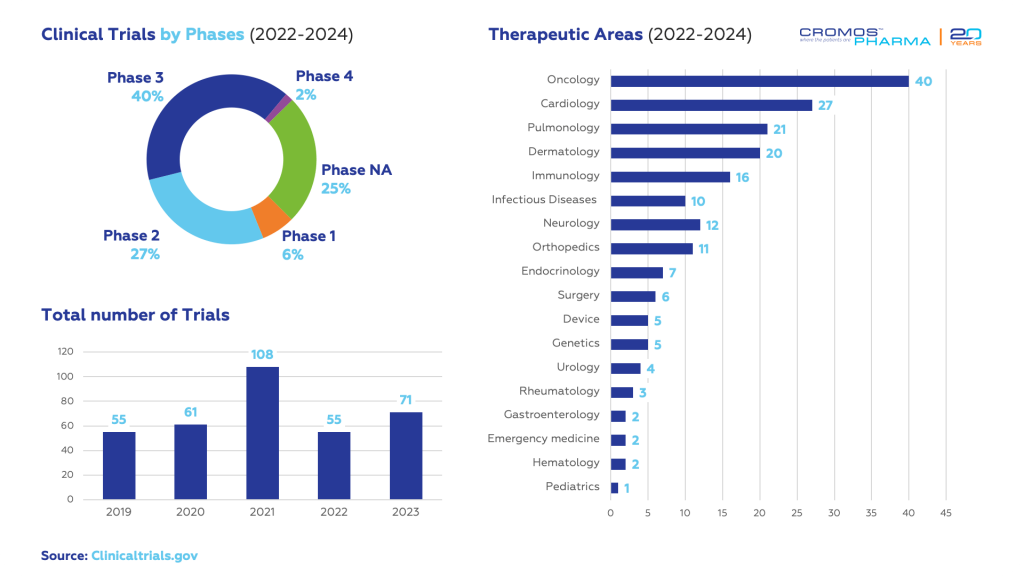
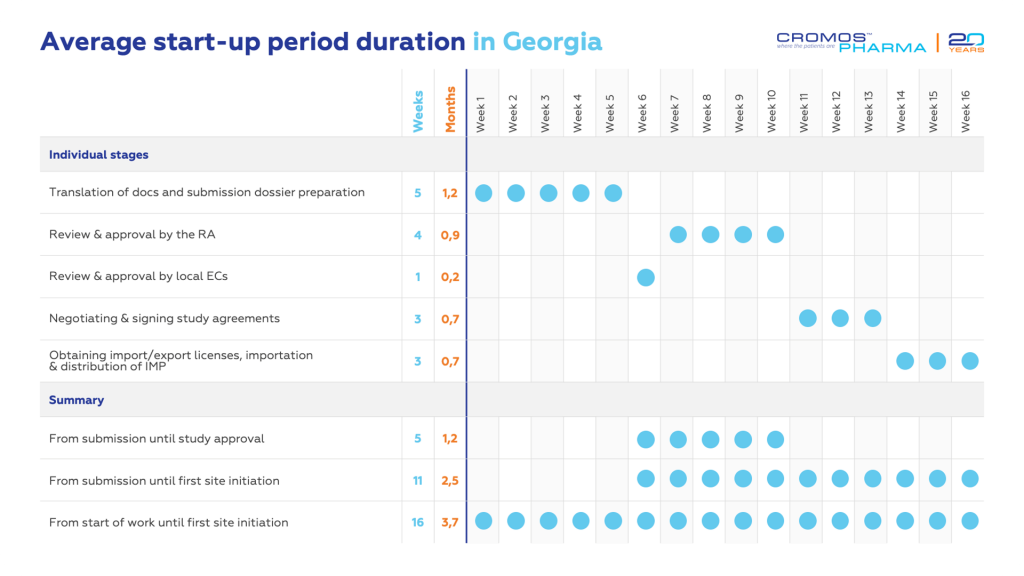
Regulatory Framework for Clinical Research in Georgia
The regulatory framework governing clinical research in Georgia is overseen by the Ministry of Internally Displaced Persons from the Occupied Territories, Labor, Health and Social Affairs (MOLHSA). Key regulations include adherence to Good Clinical Practice (GCP) guidelines, ethical considerations, and reporting requirements.
The particularities of CT organization in Georgia include the need for LEC approval submitting documents to regulatory authorities (LEPL Agency for Regulation of Medical and Pharmaceutical Activities).
The Local legal entity (CRO) is the submitter and the holder of the clinical trial permit and is responsible for every activity on the territory of Georgia, including IMP logistics, import, customs clearance, declaration on the local Revenue Portal RS.ge (without this declaration, good s could not be cleared at customs), distribution /destruction /export, etc. using local 3rd party vendors (except declaration on RS.ge, which is to be done only by Clinical Trial Permission Holder) with relevant permissions on that activities.
Cromos Pharma – A Contract Research Organization operating in Georgia
With more than a decade of experience in Georgia, Cromos Pharma has profoundly marked its territory in the realm of clinical trials. The company boasts a notable legacy, underscored by its successful execution of over 30 trials. Among its numerous achievements, the initiation of Georgia’s first clinical trial in ophthalmology stands out as a pivotal moment, heralding a new era in eye health research within the region.
Furthermore, in 2023, Cromos Pharma achieved a landmark success by receiving approval to conduct the very first Genetically Modified Organism (GMO) clinical trial. This approval not only represents a historic moment for Cromos Pharma itself but also sets a new benchmark in GMO research globally.
Cromos Pharma boasts a seasoned team in Georgia, skilled in navigating the regulatory and contracting landscape to kick-start studies as swiftly as possible. Our workforce is composed of highly qualified and adept individuals, ensuring each trial we oversee in Georgia is marked by superior data quality and dependable outcomes.
Leveraging global insights with profound local familiarity, Cromos Pharma excels in patient recruitment, achieving or surpassing enrollment targets in 95% of our trials.
Should you be interested in pursuing clinical trials in Georgia, Cromos Pharma’s dedicated team is ready to address any inquiries you might have.



